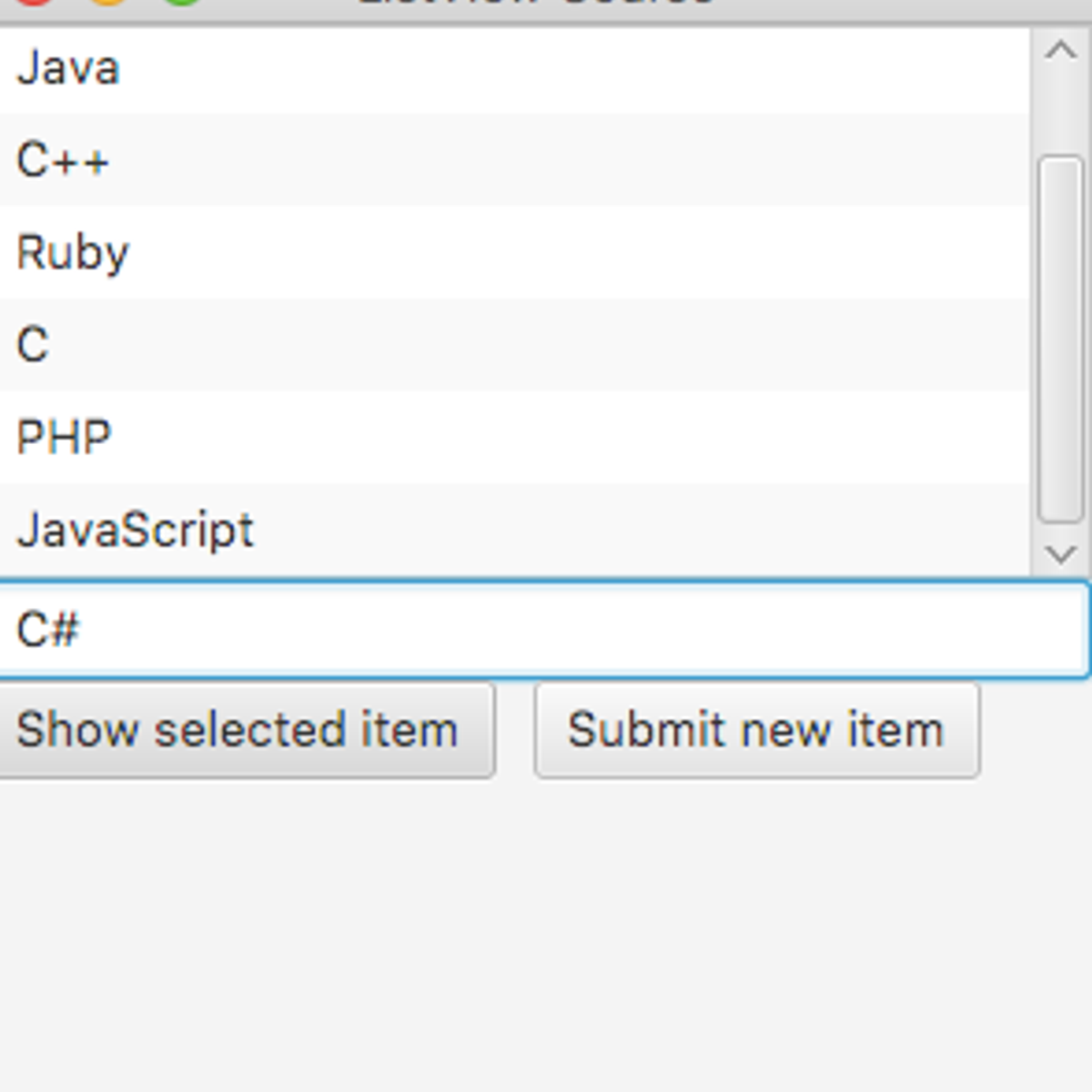
In this project, you will create a simple GUI application that displays a list using list view in JavaFX framework. A template program is provided to which you will create and add a list of programming languages, a label, two buttons, and a text field. When you click on the first button the selected list item will be fetched. When you enter a new item in the text field and click on the second button, the new item will be added to the list.
What's inside
Syllabus
Good to know
Save this course
Activities
Review JavaFX concepts and examples
Show steps
Refresh your understanding of JavaFX and its key concepts by exploring online tutorials and examples.
Browse courses on
JavaFX
Show steps
-
Search for online JavaFX tutorials and choose reputable resources.
-
Review the basics of JavaFX, including its architecture and key components.
-
Explore examples of JavaFX applications to see how concepts are applied in practice.
-
Try implementing simple JavaFX programs to reinforce your understanding.
Solve JavaFX exercises and challenges
Show steps
Solidify your JavaFX skills by solving a variety of exercises and challenges that test your understanding and problem-solving abilities.
Browse courses on
JavaFX
Show steps
-
Find online platforms or textbooks that offer JavaFX exercises.
-
Attempt to solve the exercises independently, focusing on understanding the concepts rather than just finding the answers.
-
Debug your solutions and identify areas where you need improvement.
-
Seek help from online forums or mentors if needed.
-
Review your solutions and reflect on the concepts you have learned.
Build a simple JavaFX application
Show steps
Demonstrate your mastery of JavaFX by creating a functional application that showcases your skills and understanding.
Browse courses on
JavaFX
Show steps
-
Define the purpose and functionality of your application.
-
Design the user interface and create the necessary JavaFX components.
-
Implement the logic and functionality of your application.
-
Test and debug your application to ensure it works as intended.
-
Deploy or share your application with others.
One other activity
Expand to see all activities and additional details
Show all four activities
Contribute to JavaFX open source projects
Show steps
Get involved in the JavaFX community by contributing to open source projects, expanding your knowledge, and helping others.
Browse courses on
JavaFX
Show steps
-
Find JavaFX open source projects on platforms like GitHub.
-
Review the project's documentation and identify areas where you can contribute.
-
Fork the project and make changes locally.
-
Submit a pull request with your proposed changes and provide detailed explanations.
-
Respond to feedback from project maintainers and make necessary revisions.
Review JavaFX concepts and examples
Show steps
Refresh your understanding of JavaFX and its key concepts by exploring online tutorials and examples.
Browse courses on
JavaFX
Show steps
- Search for online JavaFX tutorials and choose reputable resources.
- Review the basics of JavaFX, including its architecture and key components.
- Explore examples of JavaFX applications to see how concepts are applied in practice.
- Try implementing simple JavaFX programs to reinforce your understanding.
Solve JavaFX exercises and challenges
Show steps
Solidify your JavaFX skills by solving a variety of exercises and challenges that test your understanding and problem-solving abilities.
Browse courses on
JavaFX
Show steps
- Find online platforms or textbooks that offer JavaFX exercises.
- Attempt to solve the exercises independently, focusing on understanding the concepts rather than just finding the answers.
- Debug your solutions and identify areas where you need improvement.
- Seek help from online forums or mentors if needed.
- Review your solutions and reflect on the concepts you have learned.
Build a simple JavaFX application
Show steps
Demonstrate your mastery of JavaFX by creating a functional application that showcases your skills and understanding.
Browse courses on
JavaFX
Show steps
- Define the purpose and functionality of your application.
- Design the user interface and create the necessary JavaFX components.
- Implement the logic and functionality of your application.
- Test and debug your application to ensure it works as intended.
- Deploy or share your application with others.
Contribute to JavaFX open source projects
Show steps
Get involved in the JavaFX community by contributing to open source projects, expanding your knowledge, and helping others.
Browse courses on
JavaFX
Show steps
- Find JavaFX open source projects on platforms like GitHub.
- Review the project's documentation and identify areas where you can contribute.
- Fork the project and make changes locally.
- Submit a pull request with your proposed changes and provide detailed explanations.
- Respond to feedback from project maintainers and make necessary revisions.
Career center
Software Developer
Java Developer
Software Engineer
Java Programmer
Computer Programmer
Applications Developer
Web Developer
Systems Analyst
Software Tester
Information Technology (IT) Consultant
Web Designer
Computer Support Specialist
User Interface (UI) Designer
Database Administrator
Data Analyst
Reading list
Share
Similar courses
OpenCourser helps millions of learners each year. People visit us to learn workspace skills, ace their exams, and nurture their curiosity.
Our extensive catalog contains over 50,000 courses and twice as many books. Browse by search, by topic, or even by career interests. We'll match you to the right resources quickly.
Find this site helpful? Tell a friend about us.
We're supported by our community of learners. When you purchase or subscribe to courses and programs or purchase books, we may earn a commission from our partners.
Your purchases help us maintain our catalog and keep our servers humming without ads.
Thank you for supporting OpenCourser.



